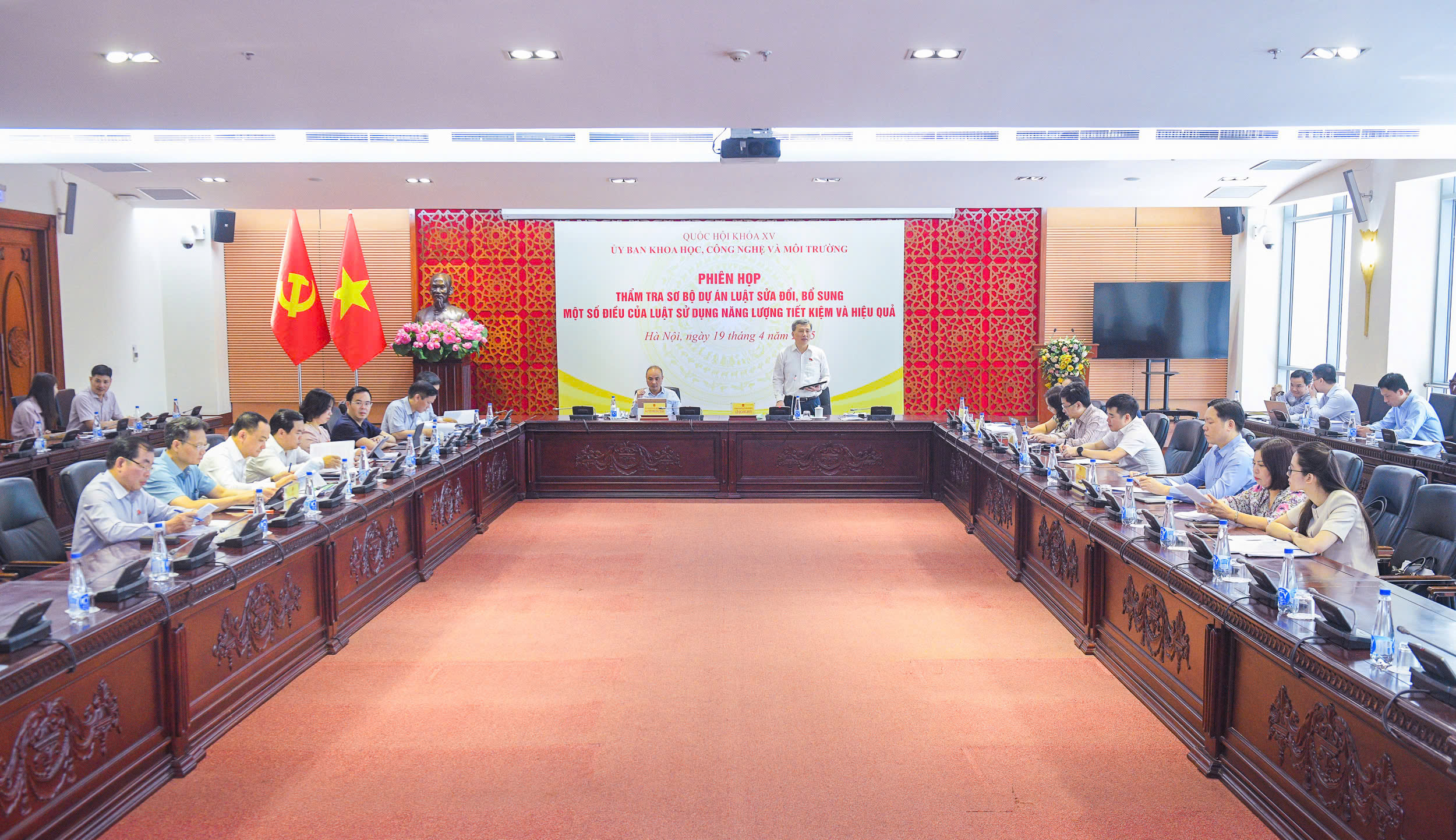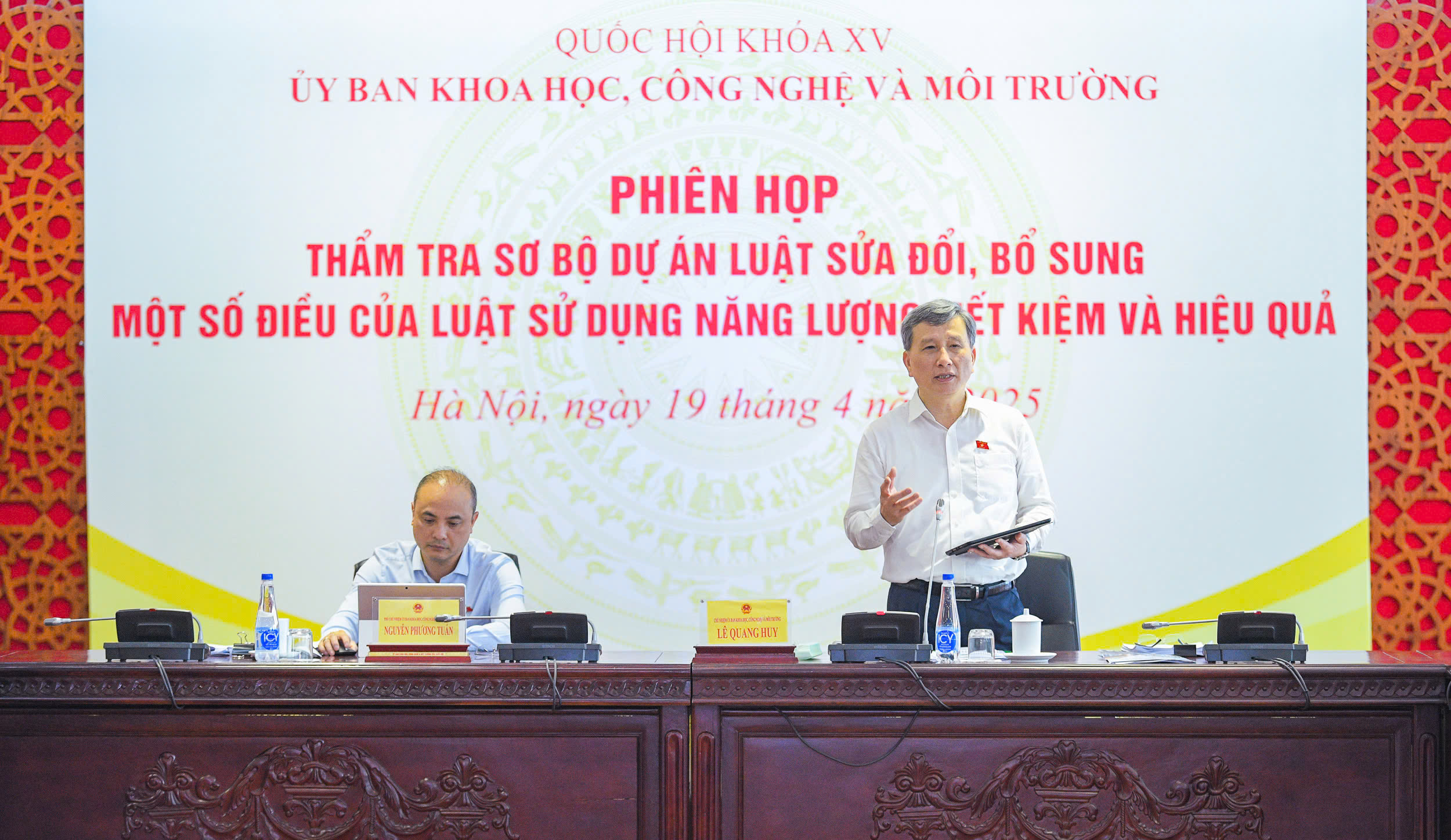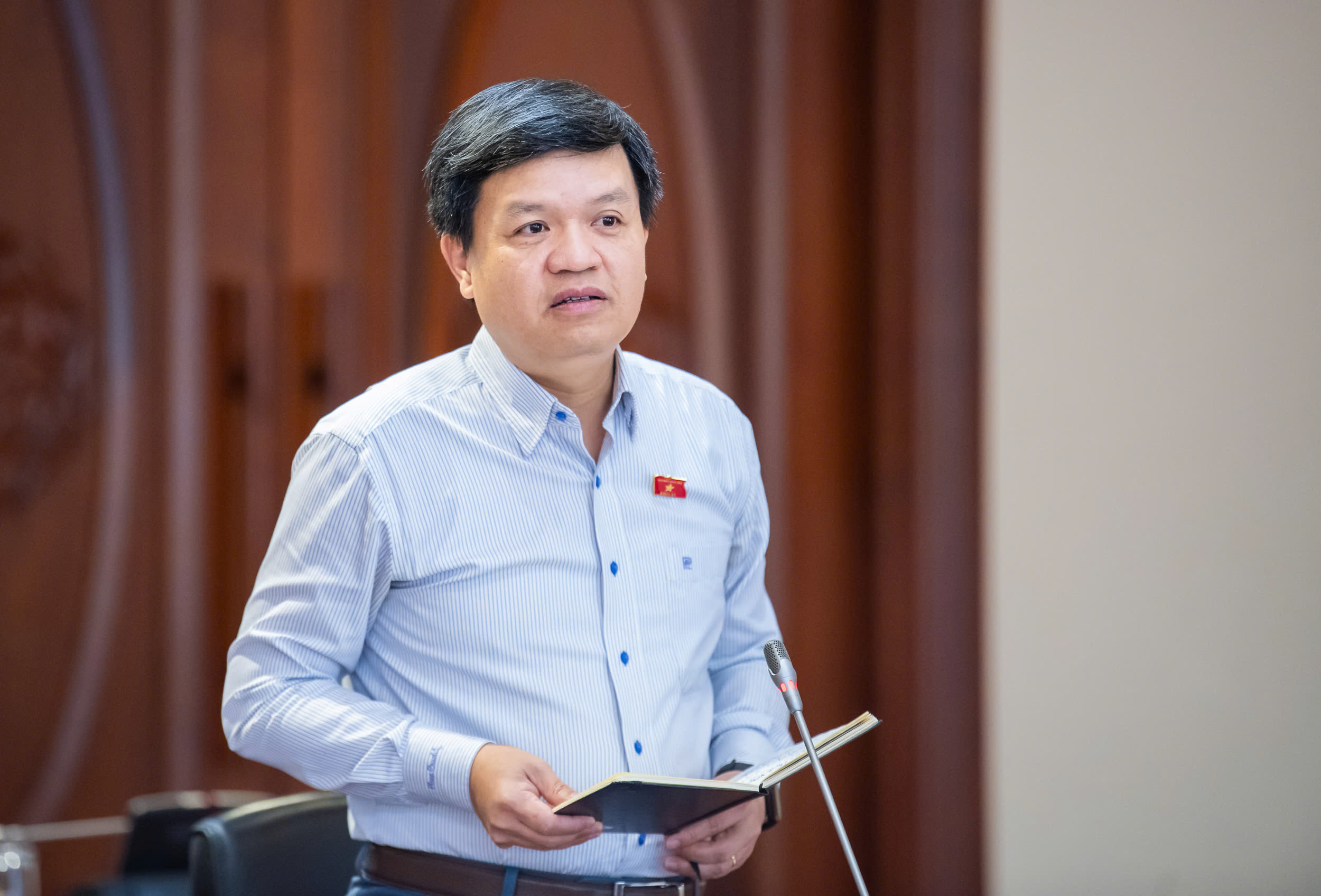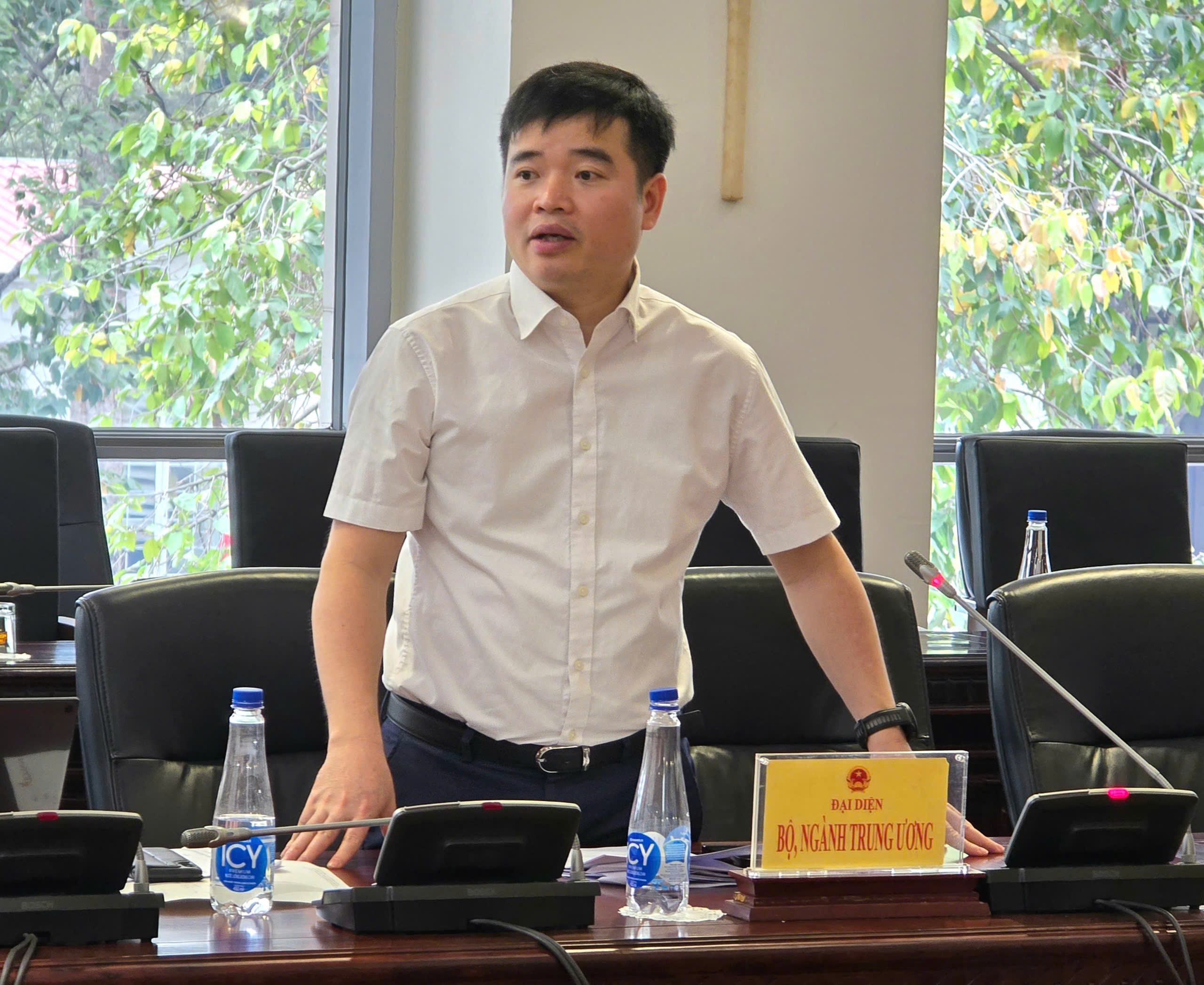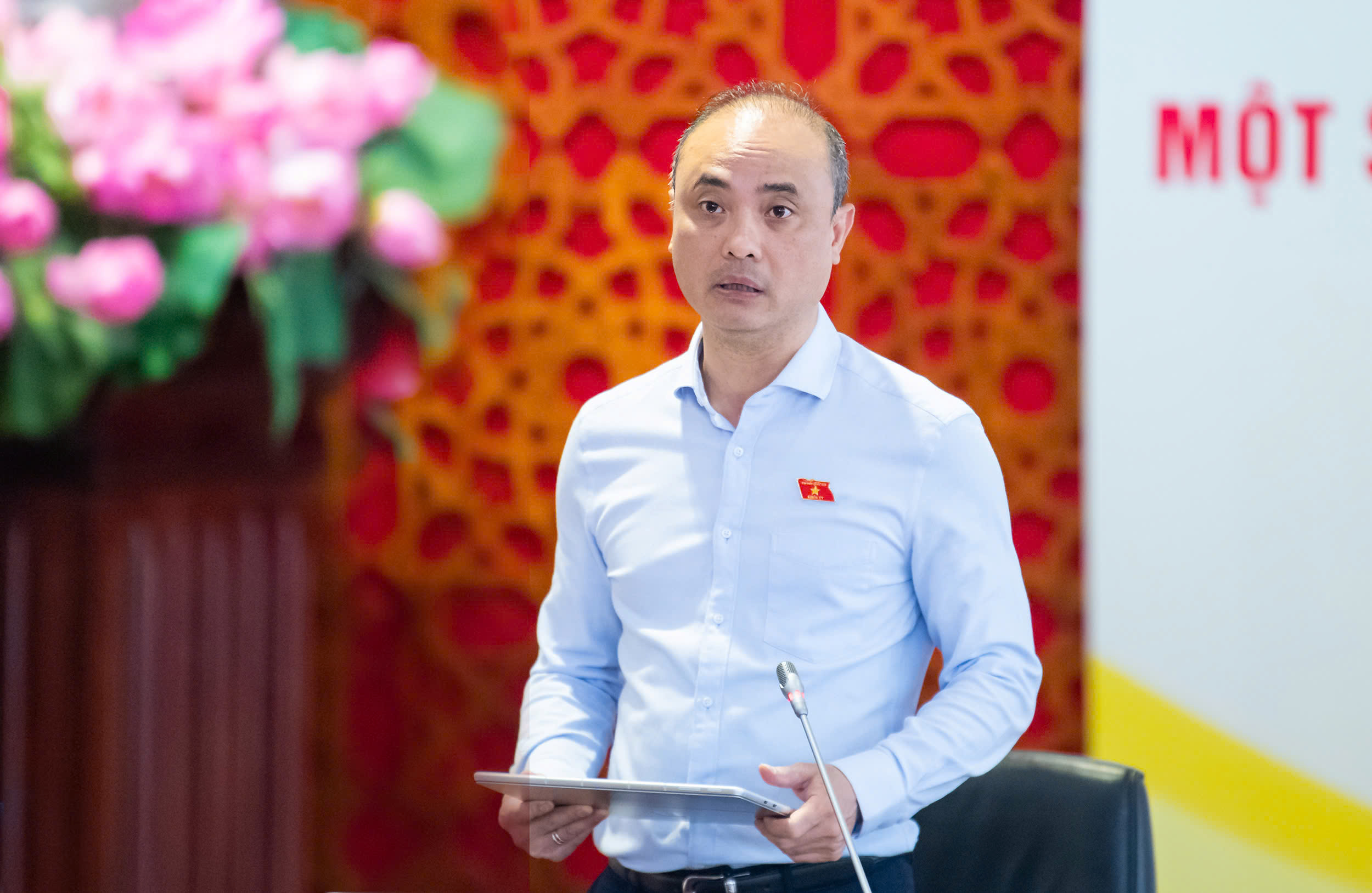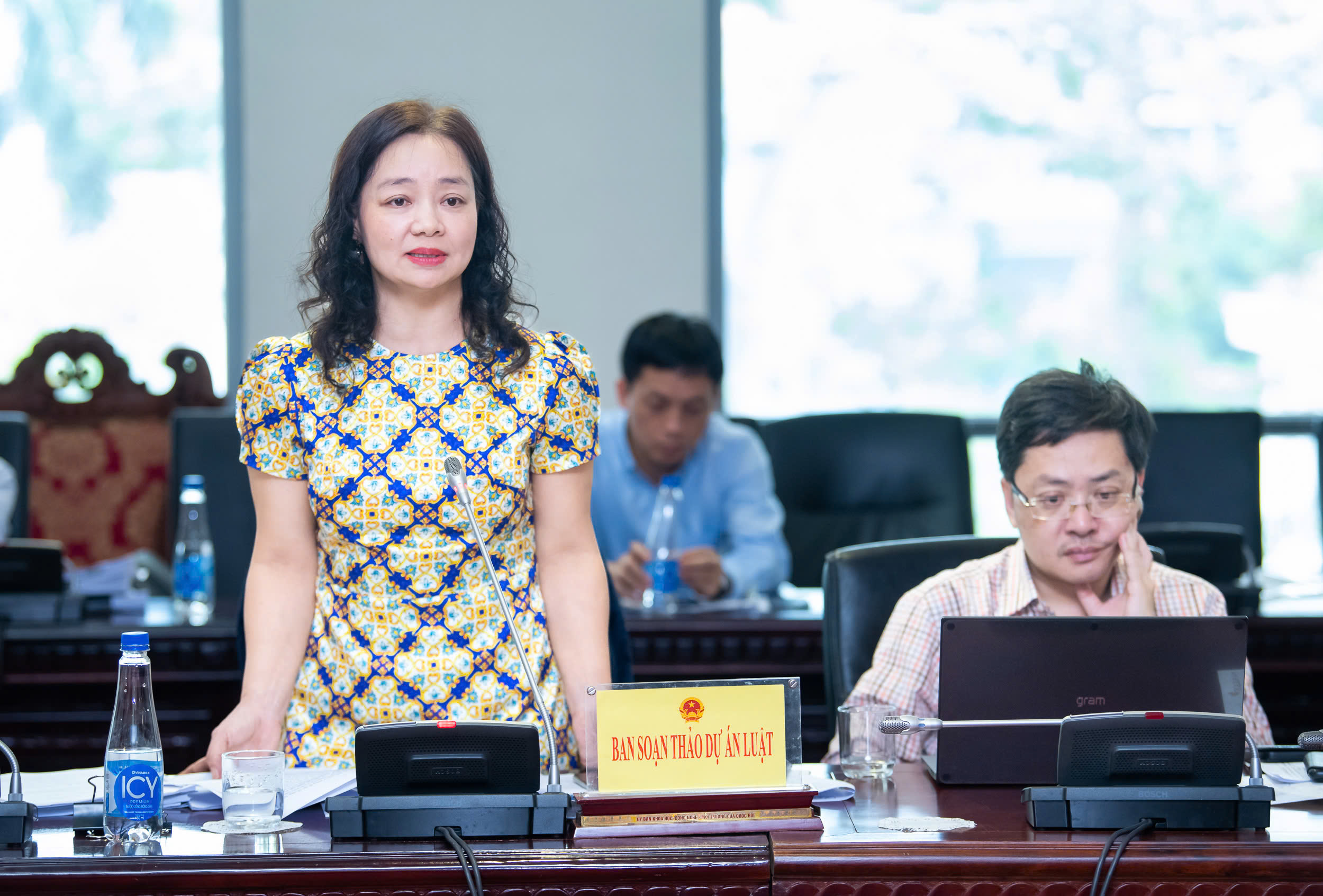The session was chaired by Mr. Le Quang Huy – Chairman of the Committee on Science, Technology, and Environment of the National Assembly, along with Vice Chairmen Mr. Nguyen Phuong Tuan and Mr. Ta Dinh Thi, as well as Committee Members who are full-time National Assembly deputies. Representatives from other National Assembly Committees were also present.
Overview of the meeting.
Participants from the Ministry of Industry and Trade included Mr. Nguyen Hoang Long, Deputy Minister of Industry and Trade, Ms. Nguyen Thi Lam Giang, Director General of Innovation, Green Transition, and Industrial Promotion Agency, and representatives from various ministries and sectors: National Defense, Home Affairs, Science and Technology, Construction, Foreign Affairs, and the Central Committee of the Vietnam Fatherland Front.
Creating a Legal Framework for Enterprises Amidst Integration Pressures
In his directive speech at the session, Mr. Le Quang Huy emphasized the critical importance of focusing on at least three major transitions: digital transformation, energy transition, and green transition. These three issues are closely interconnected in energy efficiency and conservation.
Mr. Le Quang Huy – Chairman of the Committee on Science, Technology, and Environment of the National Assembly's directive speech.
Regarding the viewpoint on amending the law, the Committee Chairman highlighted key concerns such as legal consistency, constitutionality, legality, and the scope of amendments. He also stressed the need to carefully review the four policy groups proposed by the Government, covering state management, economic and financial tools, energy services, and energy service companies (ESCOs).
According to Mr. Le Quang Huy, ESCO services have grown strongly globally. ESCOs can provide consultancy and propose solutions for energy efficiency and conservation, and therefore, they should receive appropriate attention from lawmakers.
The draft amendment to the Law on Energy Efficiency and Conservation, submitted by the Government to the National Assembly during the 9th session, is seen as a significant step amid increasingly stringent technical barriers related to carbon emissions in major export markets such as the EU, the United States, Japan, China, and South Korea.
In his report at the review session, Deputy Minister of Industry and Trade Nguyen Hoang Long emphasized that after 15 years of implementation, the Law on Energy Efficiency and Conservation (Law No. 50/2010/QH12) has revealed several shortcomings and no longer meets the demands of green production transformation in the current context. Meanwhile, globally, countries are accelerating the implementation of policy tools such as carbon taxes, Carbon Border Adjustment Mechanism (CBAM), green labeling, and carbon passports to classify goods based on emission standards.
Deputy Minister of Industry and Trade, Mr. Nguyen Hoang Long summarizes the main content of the Draft Law.
This poses considerable pressure on Vietnamese enterprises in key export sectors such as textiles and garments, footwear, steel, plastics, and electronics. Regional countries like Thailand, Malaysia, and Singapore have also begun to introduce emission-related tax regulations and policies, making the competition not only about technology but also about the legal framework supporting the transition.
“While developed countries already have strong mechanisms in place to support businesses, such as the Voluntary Agreement (VA) models of the EU and the US, or ESCO models in South Korea and Thailand, Vietnam still faces ‘insufficient and weak’ mobilization of resources,” the Deputy Minister emphasized. “Therefore, amending the law aims to create a new legal framework that encourages enterprises to adopt energy-saving technologies, enhances competitiveness, and enables them to adapt to new global emission regulations.”
The law amendment is intended to boost the competitiveness of Vietnamese enterprises against challenges posed by technical barriers from the European Union (EU), the United States, Japan, and other global markets. This will be achieved through financial support tools and incentive mechanisms that promote investment in energy efficiency and conservation projects, particularly via fund-based mechanisms. It will also foster the development and expansion of the energy consulting services market.
At the same time, it contributes to Vietnam’s proactive and active implementation of its commitments under the United Nations Framework Convention on Climate Change, particularly those outlined at the 26th Conference of the Parties (COP26).
Vice Chairman of the Committee on Science, Technology, and Environment, Mr. Ta Dinh Thi, speaks at the meeting.
Streamlining Procedures, Increasing Decentralization, and Promoting Performance-Based Markets
The draft law retains 30 out of 48 articles from the current law and introduces revisions aimed at streamlining, modernizing management, and aligning with international practices.
Deputy Minister Nguyen Hoang Long noted that one of the key highlights of the revised draft is the strong delegation and decentralization of authority to localities and specialized ministries. Specifically, the power to announce the list of key energy-consuming facilities will be transferred from the Prime
Minister to provincial and municipal People’s Committees. Similarly, the authority to issue the list of equipment and appliances requiring energy labeling will be assigned to the relevant ministries instead of the central government.
In terms of administrative reform, the draft boldly proposes cutting two out of four existing procedures (a 50% reduction). For example, the certification procedure for energy labeling will be replaced by a self-declaration model where businesses can self-label their products. Additionally, the requirement for energy auditor certification will be removed, paving the way for a more proactive energy management model.
Simplifying procedures and decentralizing authority not only reduces compliance costs for businesses but also shortens administrative processing time by up to 30%, in line with the government’s push for e-Government and economic institutional reform in the digital age.
Aligning with International Commitments, Promoting the Circular Economy
One of the draft law’s major strengths is its high compatibility with international commitments to which Vietnam is a party, including the Paris Agreement on climate change and the COP26 targets for achieving net-zero emissions by 2050.
Deputy Minister of Industry and Trade Nguyen Hoang Long affirmed that the amended provisions do not conflict with any ratified international treaties and contain no gender-discriminatory elements.
In particular, the draft law aims to develop a professional energy services market, encouraging the formation of consulting organizations, financial support entities, and technology transfer initiatives to promote a circular economy and cleaner production.
Regarding the legislative process, the Ministry of Industry and Trade stated that it strictly adhered to all required procedures, from soliciting feedback from ministries, localities, associations, experts, and businesses to publishing the draft widely on the Government's Electronic Information Portal. On April 1, 2025, the Government officially approved the draft under Resolution No. 69/NQ-CP.
Mr. Nguyen Cong Thinh, representative of the Ministry of Construction, participated in the explanation at the meeting.
Ready for Review by the National Assembly’s Standing Committee
Presenting the preliminary appraisal report, Mr. Nguyen Phuong Tuan, Vice Chairman of the National Assembly’s Committee on Science, Technology and Environment, stated that the committee’s leadership agreed with the necessity of amending and supplementing certain provisions of the Law on Energy Efficiency and Conservation, as outlined in the Government's submission No. 176/TTr-CP.
Mr. Nguyen Phuong Tuan, Vice Chairman of the National Assembly’s Committee on Science, Technology and Environment, presents the audit report.
Upon review, the committee found that the draft law dossier had been prepared thoroughly and fundamentally meets the requirements stipulated in Article 64 of the Law on Promulgation of Legal Normative Documents, making it eligible for consideration by the National Assembly’s Standing Committee before being submitted at the 9th session meeting of the National Assembly.
However, the appraisal agency also recommended that the drafting body continue to review and evaluate each item under the four proposed policy groups to ensure consistency. The revised provisions should meet both the practical demands of state management and international integration requirements.
At the session, delegates commended the drafting agency for its prompt development of the draft and expressed general agreement with the four policy areas proposed by the Government.
Additionally, delegates provided input on several key topics, including: Energy labeling and related product standards; Support for vulnerable groups in remote and disadvantaged areas; ESCO services; The fund promoting energy efficiency and conservation; Management measures for efficient energy use in vehicles and equipment; Energy use in production and energy supply facilities; Designation of key energy users; Energy management certification.
Ms. Nguyen Thi Lam Giang, representing the drafting agency, addressed and clarified delegate concerns on topics such as energy labeling, energy management certification, and setting energy consumption benchmarks.
Ms. Nguyen Thi Lam Giang, Director General of Innovation, Green Transition, and Industrial Promotion Agency, explains and clarifies some opinions raised by delegates.
Deputy Minister Nguyen Hoang Long, on behalf of the drafting agency, acknowledged and further clarified some financial mechanisms to promote energy efficiency and conservation. He reaffirmed the law's consistency with other legislation, as verified by the Ministry of Justice. He also committed to continued revisions and improvements to ensure the highest possible quality of the draft law, in alignment with the country’s development goals in this new era.
In the concluding remarks, Mr. Le Quang Huy, Chairman of the Committee on Science, Technology, and Environment of the National Assembly, confirmed that all conditions for submitting the dossier to the National Assembly’s Standing Committee had been met. He recommended that the Ministry of Industry and Trade advise the Government to supplement the draft with some guiding documents for implementation. He praised the Ministry for preparing content that aligns with the priorities of the Party and State, especially in areas such as decentralization and administrative procedure reduction, which Prime Minister Phạm Minh Chinh has directed.
The draft law is expected to be passed at the 9th session of the 15th National Assembly in May 2025, under a single-session review process.
Duc Do
